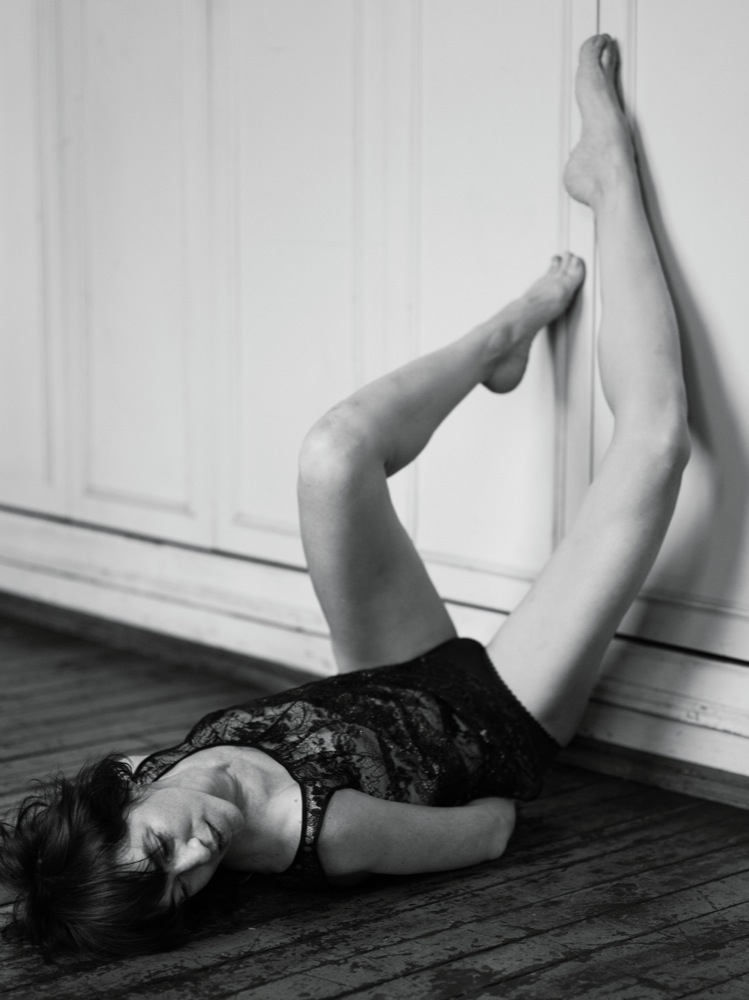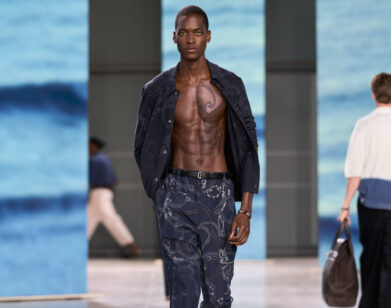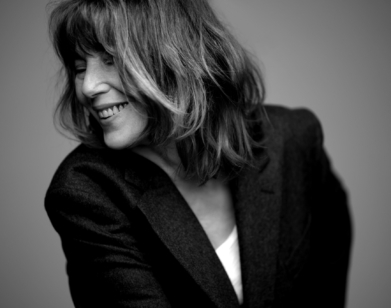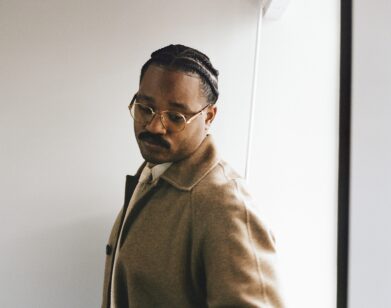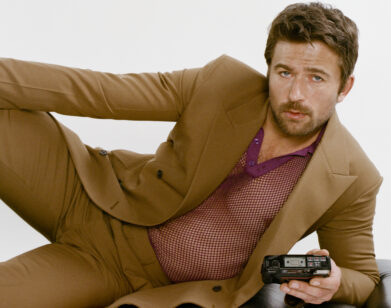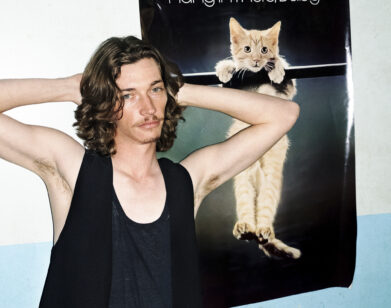The Dreamer: Charlotte Gainsbourg
“I was always a bit shy,” Charlotte Gainsbourg says in a video interview she gave us in 2012. As she speaks, she is seated in a room of a New York hotel, one foot casually tucked into her chair—an almost childlike pose—while her arms flit about her, gracefully but a bit nervously, perhaps, running interference, as do her bangs. Her voice has the hush and clarity of confession, a tender gossip, and no matter how much she tries to cover herself, to wriggle back in her chair, she cannot help but seem utterly exposed. “It’s difficult for me to look at people,” she says, “really look at them.”
As a singer, the daughter of Serge Gainsbourg and Jane Birkin can oftentimes sound a bit recessed, removed, diffuse behind sheets of jazzy static and curtains of warbling guitars—as if she’s hiding from other people. But on-screen, at least in her frequent collaborations with director Lars von Trier, Gainsbourg is given no such quarter. In Antichrist (2009), Melancholia (2011), and Nymphomaniac (2014), von Trier clearly derives an impish sort of pleasure in unbridling her, exposing her to pain, involving her in pornographic milieus or giving her outlandish, brazen confessional monologues to perform. And, to be fair, he’s on to something—in extremis, as in an impromptu interview or the back of a recording studio, Gainsbourg’s candor is arresting, her emotion clear and compelling. As hard as it may be for her to look at another, we find it almost impossible to look away.
But attention is something Gainsbourg has always had to deal with, at least since the age of 12, when she made her singing debut with her father and appeared in her first film. Maybe now, at 44, she’s just getting the hang of it. This summer she’ll be appearing in the sequel to Roland Emmerich’s alien attack epic Independence Day, and she’s already at work on several more films, including Tomas Alfredson’s adaptation of the Jo Nesbø novel The Snowman (starring Michael Fassbender), as well as an adaptation of Romain Gary’s Promise at Dawn. As her pal, the music producer Danger Mouse tells her, no matter the legacy of her enormously famous parents, no matter the inheritance of talent or money or expectations or scrutiny—or her yen to run and hide from it all—Charlotte Gainsbourg is certainly making her own name, and doing it her way.
DANGER MOUSE: Was Nymphomaniac the last thing I saw you in? That was … 2013-ish?
CHARLOTTE GAINSBOURG: Yup. I know because, right before Lars sent me the script, I told him that my daughter’s name is Joe, and he said, “What a coincidence—my character’s name is Joe.” I read the script and said, “Mmm … could you please change?” He said, “No, it’s important. I want a male name, and I want to be able to have the song ‘Hey Joe.’ ”
DANGER MOUSE: Did he suggest that you change your daughter’s name?
GAINSBOURG: Yeah! [laughs]
DANGER MOUSE: That’s what I thought. I would assume that he wrote the part for you. Did you assume that as well?
GAINSBOURG: I think so, but I don’t think he did. I was sort of the right tool for him, but I don’t think he was inspired by me.
DANGER MOUSE: But it’s not like he was sending it out to different people, Melancholia or Nymphomaniac.
GAINSBOURG: No. I did Antichrist, and then I just got a got a call from him, saying, “I’m writing another script.” That was Melancholia. And then when we were at Cannes for Melancholia, he said to the journalists, “My next film is a porn film with them”—Kirsten Dunst and me. [both laugh]
DANGER MOUSE: How do you promote these things? I saw Antichrist. Do you sit in the theaters and watch it with everyone during Cannes?
GAINSBOURG: I had to, yeah. For Antichrist, I was really nervous about people booing, because my mother had gone for a film 20 years earlier and had a terrible time with people booing, whistling, so I knew that in Cannes people can get aggressive. I thought we’d get the worst, but they were very respectful. I was even a little disappointed! [laughs]
DANGER MOUSE: Right, like maybe it didn’t go far enough. Oh gosh, I think it was far enough! Do you think, when you work with other directors, that they think, “Well, maybe we can go a little further here and there because she’ll do anything”? Like, “What can she say? She’s done all these films; we can get her to do anything we want her to do!”
GAINSBOURG: I did get a script—and I did the film [True Crime]—that was very into sex and cruelty, and I knew that, yes, they had seen Lars’s films.
DANGER MOUSE: What film was it?
GAINSBOURG: It’s not out yet. It’s a sort of a thriller. It has Jim Carrey in it. He’s the main character. I’m sort of the victim.
DANGER MOUSE: Do you prefer doing films, since it’s not live in front of people, like you are on tour?
GAINSBOURG: Yeah. I haven’t found a comfortable place onstage. I’m sure it doesn’t have to be comfortable, but I’m very nervous, so I don’t enjoy myself.
DANGER MOUSE: So no theater for you then?
GAINSBOURG: I’ve done it once, and I loved the work. I didn’t go to acting school, so it was great to be able to rehearse for a month or two, to workshop, and be with a director who even gave me acting exercises. This was a long time ago, in France. I didn’t have any children. I think I was 22. It was a play by David Mamet called Oleanna, quite a tough play. I loved it, but I got bored.
DANGER MOUSE: How long was the run?
GAINSBOURG: It was three months, maybe a hundred performances.
DANGER MOUSE: What were the nerves like before the first one or two?
GAINSBOURG: I thought I’d collapse. But in fact, it was very helpful. In the beginning of the play, I was supposed to be nervous facing the professor. And then, progressively, I was taking more and more power, so it was a fun thing to play with.
DANGER MOUSE: Outside of songs, do you write?
GAINSBOURG: No, I keep a journal, but now I find it very boring because I’ve done it for 20 years.
DANGER MOUSE: Do you ever look back, just for the hell of it, to 10 years ago?
GAINSBOURG: I did. I used to write fake entries for a lover I had when I was 15. I used to invent things, and we had a ritual: Each time we met, he had to read my journal. So it was like an open letter. And then I read it … and it was so stupid.
DANGER MOUSE: Do you still have it?
GAINSBOURG: No, thank God. There was a flood and they all got molded and blegh. But it’s funny to look back. For years and years, after my father died, I wrote only desperate, depressing thoughts. And then I had children and started writing about them. And I thought, in case they ever found them, or in case once I one day decided to go back through them, I picked only the good stuff to write about them. But I think it’s all a bit egocentric.
DANGER MOUSE: I mean, people know a lot about your father and your mother, so people are going to want to know things about them, and about you, whether you’re here or not. It’s everybody’s fantasy to show up to their own funeral and it is amazing and everybody’s there—”Hey, they really did understand, and they really do love me.” So if you write about yourself, I think people would want to see it. And, with enough time and distance, it’s romantic. Like, a hundred years from now, anything you’re writing is going to be extremely romantic, as opposed to something you wrote yesterday or even two years ago.
GAINSBOURG: I’d love to be able to write again, but I’m so repetitive. And it was all about fear. Never positive. Just indulgent about my sadness.
DANGER MOUSE: Did you go to shrinks or anything like that?
GAINSBOURG: I went to this very old man in France from the age of 18 until I moved here. For 25, 30 years.
DANGER MOUSE: You ever try anybody else?
GAINSBOURG: I tried someone very nice here, but it’s not like he was accompanying me throughout the years. It was someone I respected, but in the end, I knew what he was going to say. [laughs]
DANGER MOUSE: When you were younger, did you think what your father or mother did was art?
GAINSBOURG: They always underplayed it. He was always saying that his songs were not an art form. In French, we say that classical music is a major art, and he was always saying that what he was doing was a minor art. And my mother was always saying how bad she was in films, always feeling that she was not good enough. But very openly, as a way of dealing with the fact that they were well known. At the same time, my father was extremely pretentious, but in a really funny way. He always thought—and he was right—that he was the best around. At the time he wasn’t the “genius” he is considered now, so he was funny, just being obsessed by himself and buying newspapers every day to see if he was in them.
DANGER MOUSE: It’s funny because that’s the way a lot of people are right now on social media and Instagram. It’s very easy; they can check on to see if people are talking about them.
GAINSBOURG: I was embarrassed. I thought it was so egocentric.
DANGER MOUSE: Well, it’ll never be enough, right? I mean you’re never going to get to a point where you’re like, “All right, now I’m happy.”
GAINSBOURG: His was a legitimate obsession about what people thought about him. And he could never understand, when I started doing films and had magazine covers, that I couldn’t care less. I hated what I looked like, physically. And he couldn’t understand why I wasn’t excited at having my face on a magazine.
DANGER MOUSE: So when you were in films and you were on the cover of a magazine, was it odd to go to school the next day?
GAINSBOURG: I think I developed a very closed personality. I didn’t really have friends. I changed schools every year.
DANGER MOUSE: On purpose?
GAINSBOURG: On purpose.
DANGER MOUSE: You said, “I don’t want to do this anymore.”
GAINSBOURG: Yeah, I asked. At the time, you had the choice of all the schools around yours, so the choice was quite big. And then I went to boarding school. Each time I changed, it was as if, on purpose, I didn’t want anyone to know too much about me, which of course now I regret, because I closed myself to everything. But it was my way of dealing with things. I hope I was a nice person; it’s just I was very quiet. I had two old friends, but I lost them quite early, and because I had this love affair that was secret—because he was much older—everything was a secret, always, even to my parents.
DANGER MOUSE: How long did that relationship last?
GAINSBOURG: Five years—14 to 19.
DANGER MOUSE: Did you ever think of going off on your own, out someplace in the world, running away, or just being separate from your family?
GAINSBOURG: Never. Now, yes, but at the time, no, I was very attached to my family when my father died. I was 19. It was a time where I needed him because this affair stopped, and I was in a bad state. I was about to go live with my father right when he died, so it was very intense. I held on to any family I could get. And then I met Yvan [Attal]. He’s not my husband because we’re not married, but we’ve been together since I was 19. I think I met him when I was 18, but we were together a month after my father died. And he was so patient because I was a wreck. I used to cry every single day. Every time he would go do something, I would collapse. And then when I had my first child, I was 25, the world opened. He said once that I was looking into death, and when I gave birth, I looked to life. I was creating my new family, but I was so attached to where I come from, the origins, the Russian side, the English side. It means something to me.
DANGER MOUSE: Where does your mom live now?
GAINSBOURG: In Paris. When I lost my sister [Kate Barry, in 2013], it was so traumatizing that, for the first time in my life, I just left. I needed to. Did you do something like that?
DANGER MOUSE: I did. I moved to London without knowing anybody, when I was about 23. I grew up in the suburbs of New York and Atlanta, a suburban kid. I went to university, and that’s where I started doing music, but I felt like I had to leave. I almost didn’t think I could do it on my own. I thought I had to do something really dramatic, and then it would just happen.
GAINSBOURG: You left with nothing?
DANGER MOUSE: Nothing. I didn’t know anybody. I lived there for almost two years working in a pub, making music, trying to get signed, and I eventually did, but I wouldn’t go back to that. I basically ran out of steam in London. It was just too depressing. I was alone with my own thoughts a lot. I like depressing music, I like depressing movies—I was around that all the time. [Gainsbourg laughs] And being in London where it rains constantly was too much. I visited L.A. to record. It was, like, 75 degrees in December, and it was cheaper than London, so I was like, “I’m just going to move to L.A. for a little while and see what happens.” I thought it would be nice and, you know, there’s pretty women there. I’ve been here for 13 years now. I guess I never really left. You ever shot any movies in L.A.?
GAINSBOURG: Nope. I’d be very curious to work there, because each time I worked with Beck, I loved being active there. As soon as nothing was happening, though, I got so depressed.
DANGER MOUSE: Where did I meet you first? Was it backstage at your first show in New York?
GAINSBOURG: Yes. That was my first anything. Well, I think I did one terrible showcase in Paris where I thought, “This is the end. It’s not my thing.” And then that was the second one.
DANGER MOUSE: I thought it was good. I thought it went well.
GAINSBOURG: I’m not very good. [Danger Mouse laughs] I don’t want to be pretentious, you know? With performance, I think you should just do it simple. But the problem with me in doing things simply is that I feel I’m not enough. It’s all very embarrassing.
DANGER MOUSE: But if you did it in a way that was easier for you, it would make you want to do it more, right?
GAINSBOURG: I’m sure.
DANGER MOUSE: And, right now, things spread pretty quickly. If people didn’t like the show and you did it the way you wanted to do it, at least you would know.
GAINSBOURG: That’s true. [laughs]
DANGER MOUSE: But people might like it. And at least you have that in your back pocket, like an experiment.
GAINSBOURG: Do you look at what people say online?
DANGER MOUSE: I’m pretty tough-skinned. I think people have been nicer to me than they should’ve been over the years, to be honest …
GAINSBOURG: But you read the social media and all that?
DANGER MOUSE: No, not in that way. I just meant, when I put out a record, I’ll know whether the reviews were good or not, and for the most part, I do okay. And it’s usually because I’m working with somebody who’s already great. Like, James Mercer, he’s great. So of course when he’s singing, people want to hear it. So I cover my ass, basically. [Gainsbourg laughs] But I’m 38 now—I still want people to like it—but sometimes I think I haven’t gone far enough, because I haven’t had strong enough reactions on the negative side.
GAINSBOURG: I see.
DANGER MOUSE: Do you think you’ll ever direct a film?
GAINSBOURG: Well, for this album, because it’s so personal, a good friend of mine who’s helping me with a lot of the imagery said, “You have to film stuff yourself. You have to try.”
DANGER MOUSE: With actors?
GAINSBOURG: I think she just means to try expressing myself with the camera.
DANGER MOUSE: Do you take pictures?
GAINSBOURG: I draw. But I would love to be able to do a film. I would love to be able to focus on what excites me in watching actors. Maybe one day. I don’t have a career plan. I’ve never done that. Things happen accidentally and I’ve been lucky. I don’t have tons of scripts where I don’t know what to choose and I’m trying to calculate. It’s either I read something and I have an impulse to do it, or in meeting someone, I want to work with them, but it’s always been very obvious. I was so lucky because I started working very young. And my father was very wealthy and I didn’t need to work. I did my films. I was very well paid for my age, and I could make choices, decide not to do a film for six months and wait until I’d get the right thing. Which made me quite a coward, you know. It’s so easy to say no to stuff, and then, after a while, it’s very hard to go back in.
DANGER MOUSE: But it seems like you work more now than ever. Why do you think that is? Is it kids?
GAINSBOURG: I think, being an actress, you know that you’re getting old. I’m 44. I mean, an agent said when I turned 40, “It won’t get better.”
DANGER MOUSE: Right. “Hope you’ve had fun.” [laughs]
GAINSBOURG: So maybe, in the back of my head, I’m thinking I have to do as much as I can. It’ll stop.
DANGER MOUSE: You’re on the run. You have all of these films coming up, a lot of things going on …
GAINSBOURG: It’s been such fun for me and so exciting to be here, because I’ve lived for 30 years just being recognized for my parents.
DANGER MOUSE: And only your parents, period, in France. That’s a huge shadow.
GAINSBOURG: It’s massive. It’s every day. It’s a legacy. But coming here, it’s just such freedom. And if people recognize me, they just thank me for my films, which never happens in France. So it’s quite a discovery.
DANGER MOUSE: I remember the first time I had ever heard your name and knew you existed. Was it 5:55? I thought the album was great and I was like, “Oh, Serge has a daughter!” And then I was like, “That’s cool. And she sings!” And I thought you were, like, 22, because of your voice. And then I thought to myself, “Well, that’s not an easy thing. What the hell is she doing singing? How are you going to live up to that?” And I liked the album a lot! But thinking about that compared to who Charlotte Gainsbourg is now in 2016? It’s so different. I mean, you’re going to wind up being a huge influence on a lot of women and younger actresses, based on the roles you took and what you did—and with a sort of tough situation of having the famous-parents thing, what you turned it into is pretty cool.
GAINSBOURG: I’ve been helped.
DANGER MOUSE: It’s a very specific thing that you have been able to do. You have the thing that you do.
GAINSBOURG: I mean, it’s always collaborations, and that’s what I like. I don’t like being on my own. I’m happy meeting people and collaborating.
DANGER MOUSE: That’s how I got away with it. But I want see what happens in the next couple of years. You’re going to get a lot of stuff thrown at you. You’re going to have to start saying no a lot more. [both laugh] You will. I want to know how you’re going to mix this in with the music stuff, too. I want to hear it.
GAINSBOURG: I’d love to have your reactions. Yesterday I made my mother listen for the first time. She’s been here a week, and I was so nervous about making her listen. And she sat there, and I had to show her the lyrics. And I was so uncomfortable—so uncomfortable. And she saw how nervous I was. Ahh!
DANGER MOUSE: Did she like it?
GAINSBOURG: Yes.
DANGER MOUSE IS A GRAMMY-WINNING, LOS ANGELES-BASED PRODUCER, SONGWRITER, AND MUSICIAN.
For more from the Queens of Cool, click here.

